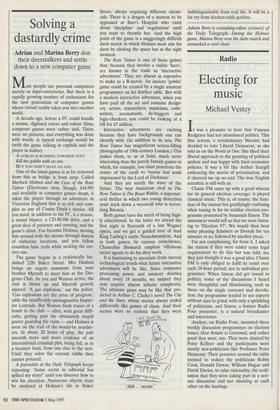Solving a dastardly crime
Adrian and Marina Berry don their deerstalkers and settle down to a new computer game
Most people use personal computers merely as super-secretaries. But there is a rapidly growing number of enthusiasts for the new generation of computer games whose virtual reality takes you into another world.
A decade ago, before a PC could handle a mouse, digitised voices and colour films, computer games were rather dull. There were no pictures, and everything was done with words. A typical exchange would be (with the game talking in capitals and the player in italics): A GOBLIN IS RUSHING TOWARDS YOU!
Kill the goblin with an axe.
BUT YOU DON'T HAVE AN AXE.
One of the latest games is as far removed from this as bridge is from snap. Called Sherlock Holmes and the Case of the Rose Tattoo (Electronic Arts, Slough, £44.99) and available at computer games shops, it takes the player through an adventure in Victorian England that is as rich and com- plex as any of Conan Doyle's stories. All you need, in addition to the PC, is a mouse, a sound blaster, a CD-ROM drive, and a great deal of patience and cunning, and the game's afoot. You become Holmes, moving him around with the mouse through dozens of elaborate locations, and you follow countless false trails while seeking the cor- rect one.
The game begins in a realistically fur- nished 22lb Baker Street. Mrs Hudson brings an urgent summons from your brother Mycroft to meet him at the Dio- genes Club. As you and Watson arrive, the club is blown up and Mycroft gravely injured. 'A gas explosion,' say the police. `Gas explosions are the price of progress,' adds the insufferably unimaginative Inspec- tor Lestrade. But Watson finds traces of a bomb in the club — after, with great diffi- culty, getting past the obstinately stupid porter guarding the ruins — and Holmes is soon on the trail of the would-be murder- ers. In about 20 hours of play, the pair unearth more and more evidence of an international criminal plot, being led, as in a treasure hunt, from one clue to the next. Until they solve the current riddle they cannot proceed.
A journalist at the Daily Telegraph keeps repeating: 'Some cretin in editorial has spiked my story!' until you discover how to win his attention. Numerous objects must be analysed at Holmes's lab in Baker Street, always requiring different chemi- cals. There is a dragon of a matron to be appeased at Bart's Hospital who rants about 'discipline' and 'regulations' until you want to throttle her. And the high point of the game is a staggeringly difficult darts match in which Holmes must aim his darts by clicking the space bar at the right moment.
The Rose Tattoo is one of those games that, because they involve a visible 'hero', are known in the trade as 'interactive adventures'. They are almost as expensive to make as a B-movie. An ancient 'goblin' game could be created by a single amateur programmer on his kitchen table. But with a modern interactive adventure, when you have paid all the set and costume design- ers, actors, researchers, musicians, code- writers, accountants, de-buggers and logic-checkers, you could be looking at a bill for £5 million.
Interactive adventures are exciting because they have backgrounds one can identify with. (In addition to its sets, The Rose Tattoo has magnificent screen-filling photographs of 19th-century London.) This makes them, to us at least, much more interesting than the purely fantasy games in which, for example, you must penetrate the centre of the earth to 'rescue lost souls imprisoned by the Lord of Darkness'.
And they are surely the wave of the future. The best American rival to The Rose Tattoo is The Beast Within, a supernat- ural thriller in which two young detectives must track down a werewolf who is terror- ising Bavaria.
Both games have the merit of being high- ly educational. In the latter we attend the first night in Bayreuth of a lost Wagner opera, and we get a guided tour of mad King Ludwig's castle Neuschwanstein. And in both games, by curious coincidence, Chancellor Bismarck employs villainous secret agents to do his dirty work.
It is fascinating to speculate from current technological trends what future interactive adventures will be like. Since computer processing power and memory doubles about every 18 months, we suspect they may acquire almost infinite complexity. The ultimate game may be like that pre- dicted in Arthur C. Clarke's novel The City and the Stars, whose stories always ended differently like games of chess. And their scenes were so realistic that they were Ahh ... nectar ' indistinguishable from real life. It will be a far cry from kitchen-table goblins.
Adrian Berry is consulting editor (science) of the Daily Telegraph. During the Holmes game, Marina Berry won the darts match and unmasked a card cheat.


































































 Previous page
Previous page